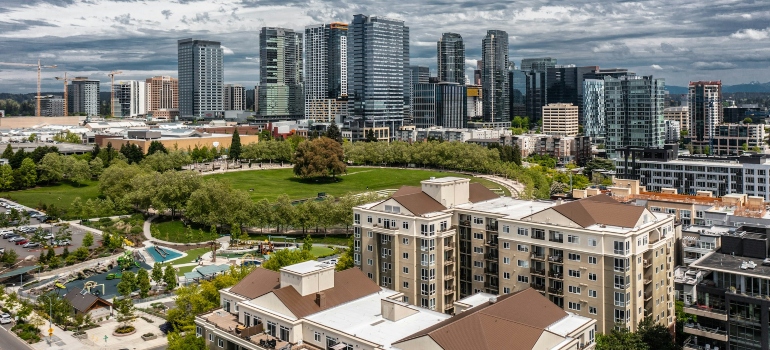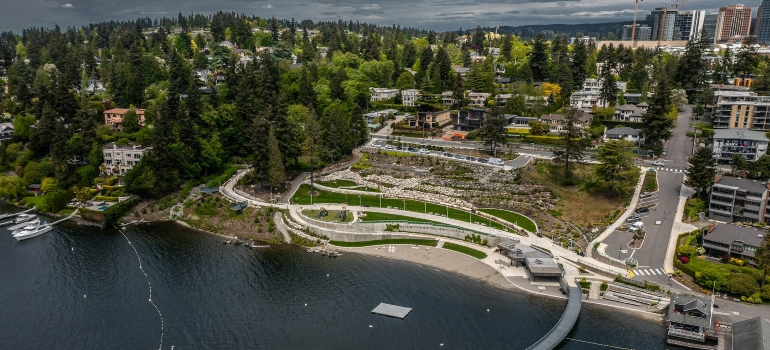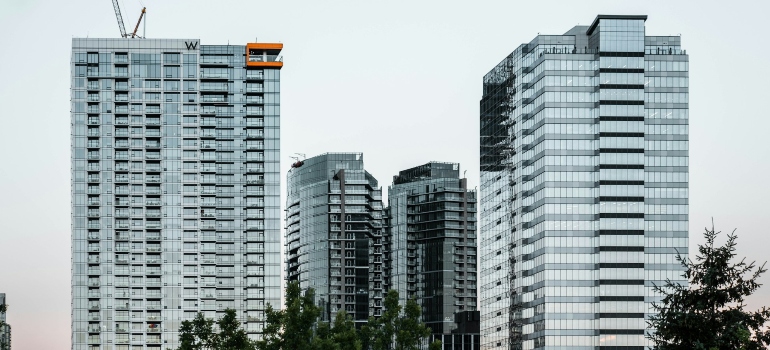Guide for Moving to Bellevue WA
Bellevue, Washington, stands out as one of the most desirable places to live in the Pacific Northwest. Located just across Lake Washington from Seattle, it combines big-city amenities with a suburban feel. Job opportunities, excellent schools, and beautiful outdoor spaces attract families, professionals, and retirees. And yet, moving to Bellevue WA requires preparation, especially when considering housing, employment, and daily expenses. Understanding the city’s neighborhoods, transportation options, and lifestyle advantages ensures a smoother relocation with your Seattle movers. Therefore, our guide explores essential details about living in Bellevue, from housing trends to entertainment choices, making settling into this dynamic city easier.
Living Costs: What to Expect in Bellevue
Bellevue ranks among the pricier cities in Washington, with costs reflecting the high demand for housing and premium lifestyle amenities. Many newcomers find budgeting essential, especially when adjusting to higher living expenses.
Housing Expenses
- Homebuyers: Median home prices hover around $1.2 million, significantly higher than the national average. Buyers often face bidding wars, pushing final sale prices even higher.
- Renters: A one-bedroom apartment costs around $2,300 per month, while two-bedroom units range from $2,800 to $3,500. Rental prices fluctuate based on proximity to downtown and modern amenities.
- Property Taxes: Washington does not impose an income tax, but property taxes in Bellevue average around 1% of a home’s value.
Additional Monthly Expenses
- Utilities: Electricity, water, and garbage collection typically total $200 to $300 per month. Seasonal changes, particularly colder winters, can increase heating costs.
- Internet and Cable: High-speed internet plans range from $60 to $120, depending on the provider. Faster fiber-optic options are available in most areas, ensuring reliable connectivity.
- Groceries and Dining: Grocery costs align with Seattle prices, with an average monthly budget of $400 to $600 per person. Shopping at local farmers’ markets can help reduce expenses while supporting small businesses.
While Bellevue demands a higher cost of living, strong employment opportunities and a robust economy balance the financial impact for many residents. Those earning competitive salaries in tech and finance often find the investment worthwhile.

Neighborhoods in Bellevue: Where to Live
Each area in Bellevue offers a distinct lifestyle, catering to various preferences and budgets. Housing options range from high-rise condominiums to spacious single-family homes, giving newcomers arriving with moving companies in Bellevue WA plenty of choices.
Downtown Bellevue: City Life at Its Best
Skyscrapers, luxury condos, and world-class shopping define this neighborhood. Ideal for professionals who prefer a walkable environment with easy access to dining, entertainment, and transit. The high demand for housing in this area keeps rental prices above the city average.
West Bellevue: Exclusive and Scenic
Home to waterfront properties, upscale homes, and stunning views of Lake Washington. This area suits those seeking privacy, larger homes, and close proximity to downtown. Many homes in West Bellevue offer private docks, adding to their appeal for boating enthusiasts.
Bridle Trails: Green Space and Serenity
Known for its tree-lined streets, equestrian trails, and spacious lots. A perfect choice for those who prioritize nature and quieter surroundings. Larger property sizes provide added privacy, making it a popular area for high-net-worth individuals.
Somerset: Family-Friendly with Great Schools
Sitting on a hillside, Somerset provides breathtaking city views and top-rated public schools to families moving to Bellevue WA. A strong sense of community and suburban appeal make it a popular spot for families. Many homes in this neighborhood feature large backyards, ideal for outdoor activities.
Factoria: Convenience and Affordability
A mix of townhomes, apartments, and single-family residences. Proximity to shopping centers, dining, and freeways enhances accessibility. Factoria remains a great option for those who want city conveniences without the price tag of downtown.
Neighborhoods in Bellevue cater to different lifestyles, offering something for professionals, families, and retirees alike. Choosing the right area depends on budget, commute preferences, and lifestyle priorities.

Real Estate Trends: Buying or Renting?
Bellevue’s housing market remains highly competitive, with property values continuing to rise. A combination of strong demand and limited inventory has driven prices up significantly over the years.
Market Trends
- Home prices: The median value exceeds $1.2 million, with luxury homes reaching several million. Many buyers secure homes by making offers well above the listing price.
- Rental costs: A steady increase in demand has driven rental prices higher, particularly in downtown and newer developments. Renters looking for budget-friendly options often explore areas further from the city center.
- Competition: Low inventory levels result in bidding wars, often pushing prices above asking amounts. A competitive edge, such as pre-approval for financing, improves chances of securing a home.
Should You Rent or Buy?
- Renting suits those uncertain about long-term plans or looking for flexibility. Shorter lease options are available, making it easier to transition into homeownership later.
- Buying makes sense for those investing in a growing market or planning to stay for several years. Real estate in Bellevue has consistently appreciated, making homeownership a strong financial move.
The real estate market in Bellevue continues to evolve, influenced by job growth and population influx. If you’re planning to purchase you should act quickly, while renters should secure leases in advance to lock in rates before seasonal price hikes. The competitive nature of the market underscores the importance of working with experienced realtors and staying informed.
Career Opportunities: Where to Find the Best Jobs
Bellevue offers a strong job market, driven by technology, healthcare, and finance. Many professionals pack their moving boxes in Seattle and relocate here for high-paying positions, especially in the booming tech industry.
Tech Industry Leads the Way
Major employers like Microsoft, Amazon, T-Mobile, and Expedia operate in and around Bellevue. The demand for software engineers, data analysts, and project managers continues to grow. Startups also thrive, attracting tech talent from across the country.
Finance, Healthcare, and Business Opportunities
Bellevue serves as a financial hub, home to banks, investment firms, and corporate headquarters. Companies like PACCAR and Symetra Financial offer stable careers. Healthcare professionals find opportunities at Overlake Medical Center and smaller clinics throughout the city. Business consulting, legal services, and real estate also contribute to a well-rounded job market.
Average Salaries and Employment Trends
Salaries in Bellevue remain higher than the national average, reflecting the city’s high cost of living. Software engineers earn around $150,000 per year, while finance and healthcare professionals make between $90,000 and $130,000. The city maintains a low unemployment rate, making it easier for newcomers to secure employment.
Bellevue’s job market remains competitive, with many companies offering relocation packages to those moving to Bellevue WA for work. Those seeking career growth, especially in technology and finance, often find excellent opportunities. After relocating with Washington movers, professionals benefit from networking with local business groups and attending industry events to connect with top employers.

Top Schools in Bellevue: Education Excellence
Bellevue’s public schools rank among the best in Washington, making the city an ideal place for families. High test scores, strong academic programs, and dedicated teachers create an outstanding learning environment.
Bellevue School District: A Top Choice
The Bellevue School District consistently ranks in the top 5% nationwide, with a strong emphasis on STEM education. Newport High School and Interlake High School receive national recognition for academic excellence. Many students participate in Advanced Placement (AP) and International Baccalaureate (IB) programs, preparing them for top universities.
Private and Alternative Education Options
Families seeking private education find excellent choices, including Forest Ridge School of the Sacred Heart and The Jewish Day School. Montessori and language immersion programs provide alternative learning environments. Those looking for specialized arts or technical programs can explore schools with focused curricula.
Higher Education and Career Training
Bellevue College offers a variety of associate degrees, certification programs, and transfer pathways to major universities. The University of Washington, located in nearby Seattle, provides a strong option for higher education. Many Bellevue residents take advantage of professional development programs to advance their careers.
Bellevue’s education system supports students at every level, from elementary school to college. Families moving to Bellevue WA prioritize school districts, often selecting neighborhoods based on top-rated institutions. Investing in education remains a key reason why many choose to settle in Bellevue.
Transportation and Commuting After Moving to Bellevue WA
Commuting in Bellevue presents different options, from public transit to well-maintained highways. Although traffic congestion occurs during peak hours, multiple transportation choices make travel more convenient.
Public Transit: Buses and Light Rail
King County Metro operates bus routes connecting Bellevue to Seattle, Redmond, and other nearby cities. Express buses offer faster commutes for professionals working in downtown Seattle. Sound Transit’s light rail expansion, expected to open soon, will improve connectivity between Bellevue and surrounding areas. This development will significantly cut down travel times.
Driving and Traffic Patterns
Bellevue’s road system includes major highways such as Interstate 405 and State Route 520, which connect the city to Seattle and Redmond. Rush-hour congestion, particularly on 405, can be frustrating. Many commuters use alternative routes to avoid long delays.
Biking and Walking Infrastructure
Bellevue invests in pedestrian-friendly streets and bike lanes, making it easier to get around without a car. Trails like the 520 Trail and Mercer Slough Nature Park paths provide scenic options for cyclists and walkers. Many neighborhoods emphasize walkability, especially in Downtown Bellevue and Factoria.
Commuters planning to move to Bellevue with HB move management will benefit from exploring transit options before relocating. With new infrastructure projects underway, transportation improvements will enhance accessibility across the city.

Bellevue’s Climate: What to Expect Year-Round
Bellevue experiences a mild, oceanic climate, with wet winters and dry, pleasant summers. The city receives about 38 inches of rain per year, similar to Seattle.
Winter: Rainy and Cool
Temperatures range between 35°F and 50°F, with frequent rain showers. Snowfall occurs occasionally but rarely accumulates for long. Many new residents moving to Bellevue WA should invest in waterproof clothing and insulated footwear to stay comfortable.
Spring and Summer: Warm and Sunny
Spring brings temperatures in the 50s and 60s, with blooming cherry blossoms and greener landscapes. Summer remains dry and warm, with highs averaging around 75°F to 85°F. The city’s outdoor spaces, including parks and hiking trails, become popular destinations during this season.
Fall: Crisp and Colorful
Autumn temperatures drop to the 40s and 50s, with trees displaying vibrant foliage. Light layers and rain jackets become essential as rainfall increases. Bellevue’s climate appeals to those who enjoy mild weather with seasonal variety. While rain dominates the colder months, the city offers enough sunshine to balance out the gray skies.
Entertainment and Recreation: What to Do in Bellevue
Bellevue offers a mix of outdoor activities, shopping, and cultural experiences. Whether exploring parks or enjoying fine dining, the city provides entertainment options for all interests.
Outdoor Activities and Parks
Bellevue’s green spaces make it easy to enjoy the outdoors. Bellevue Botanical Garden showcases seasonal flowers, walking trails, and educational exhibits. Mercer Slough Nature Park provides a scenic escape with canoeing, hiking, and wildlife viewing.
Meydenbauer Bay Park offers direct access to Lake Washington, making it perfect for kayaking and paddleboarding. Those who enjoy hiking visit Cougar Mountain Regional Wildland Park, located just outside the city.
Arts, Museums, and Nightlife
Culture thrives in Bellevue through venues like the Bellevue Arts Museum, which showcases contemporary exhibits. Meydenbauer Center hosts concerts, theater productions, and events throughout the year. Those seeking nightlife enjoy craft cocktails, live music at local venues, and laid-back bars.

Pros and Cons of Living in Bellevue
Bellevue offers many advantages, but no city is perfect. Understanding both the strengths and challenges helps newcomers decide if it’s the right place to live.
What Makes Bellevue a Great Place to Live?
- Strong economy and job market – The city boasts low unemployment and high salaries, especially in tech and finance.
- Safe and clean environment – Bellevue ranks as one of the safest cities in Washington, with well-maintained streets and low crime rates.
- Top-rated schools – The Bellevue School District consistently earns national recognition, making it a great place for families.
- Beautiful outdoor spaces – Parks, trails, and waterfront access provide plenty of recreation options year-round.
- Proximity to Seattle – Living in Bellevue means easy access to Seattle without dealing with downtown congestion daily.
Challenges of Moving to Bellevue WA
- High cost of living – Housing and daily expenses remain significantly above the national average.
- Traffic congestion – Rush-hour delays on Interstate 405 and State Route 520 create frustrating commutes.
- Limited affordable housing – Many homes in West Bellevue and downtown cater to high-income buyers.
- Rainy winters – Gray skies and frequent rainfall may take time to adjust to, especially for newcomers from sunnier climates.
Bellevue remains a highly desirable place to live despite its challenges. Those seeking career growth, safety, and top-tier amenities often find the benefits outweigh the drawbacks.
Why Bellevue Stands Out as a Great Place to Live
Bellevue continues to attract professionals, families, and retirees looking for a city with strong job opportunities, excellent schools, and a high quality of life. Its balance between urban convenience and suburban comfort makes it a top choice for relocation.
Moving to Bellevue WA requires research, but those who plan to book moving services in Seattle will settle in with ease. So, whether you’re drawn by the tech industry, top-rated schools, or recreational opportunities, as a new resident you’ll appreciate what Bellevue offers!
Why Choose Us
History
Hansen Bros. Moving & Storage is locally owned and operated by the same family for four generations, since 1890. We have a well-established reputation for service quality and reliability with a high percentage of repeat household and commercial clients.
Professionalism
We’re a certified ProMover by the American Moving and Storage Association with A+ rating with the Better Business Bureau, voted “Best in Western Washington” in 2009 and from 2011 to 2016 by KING5. Our company is fully licensed and insured and member of WMC and AMSA.
Value
Hansen Bros. Moving & Storage provide free, no-obligation in-home estimate and competitive rates, including low minimum rates for shipments moving under 300 miles. We’ve set a refund policy for unused packing materials and three Puget Sound locations to help clients save on travel fee costs.



